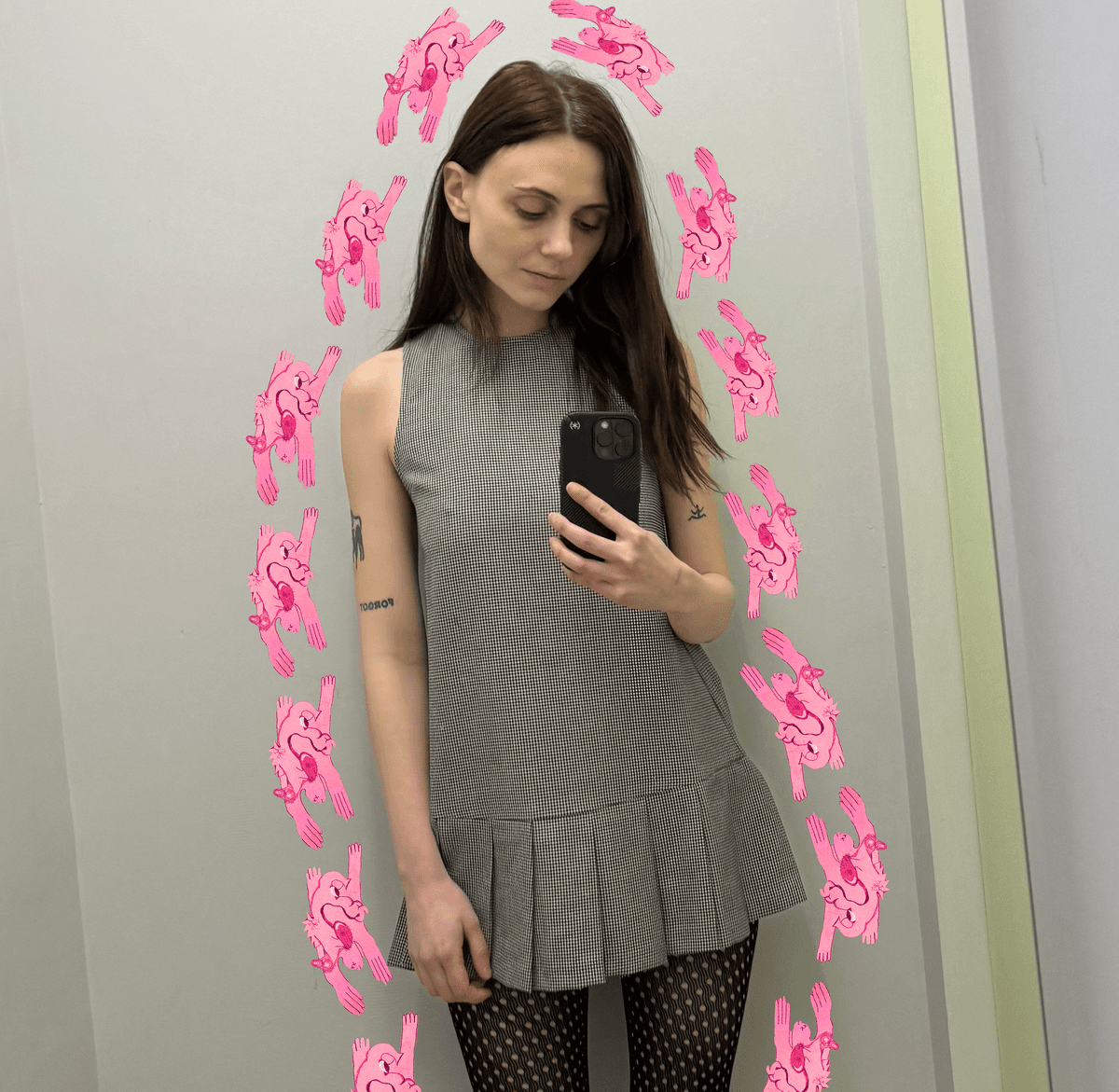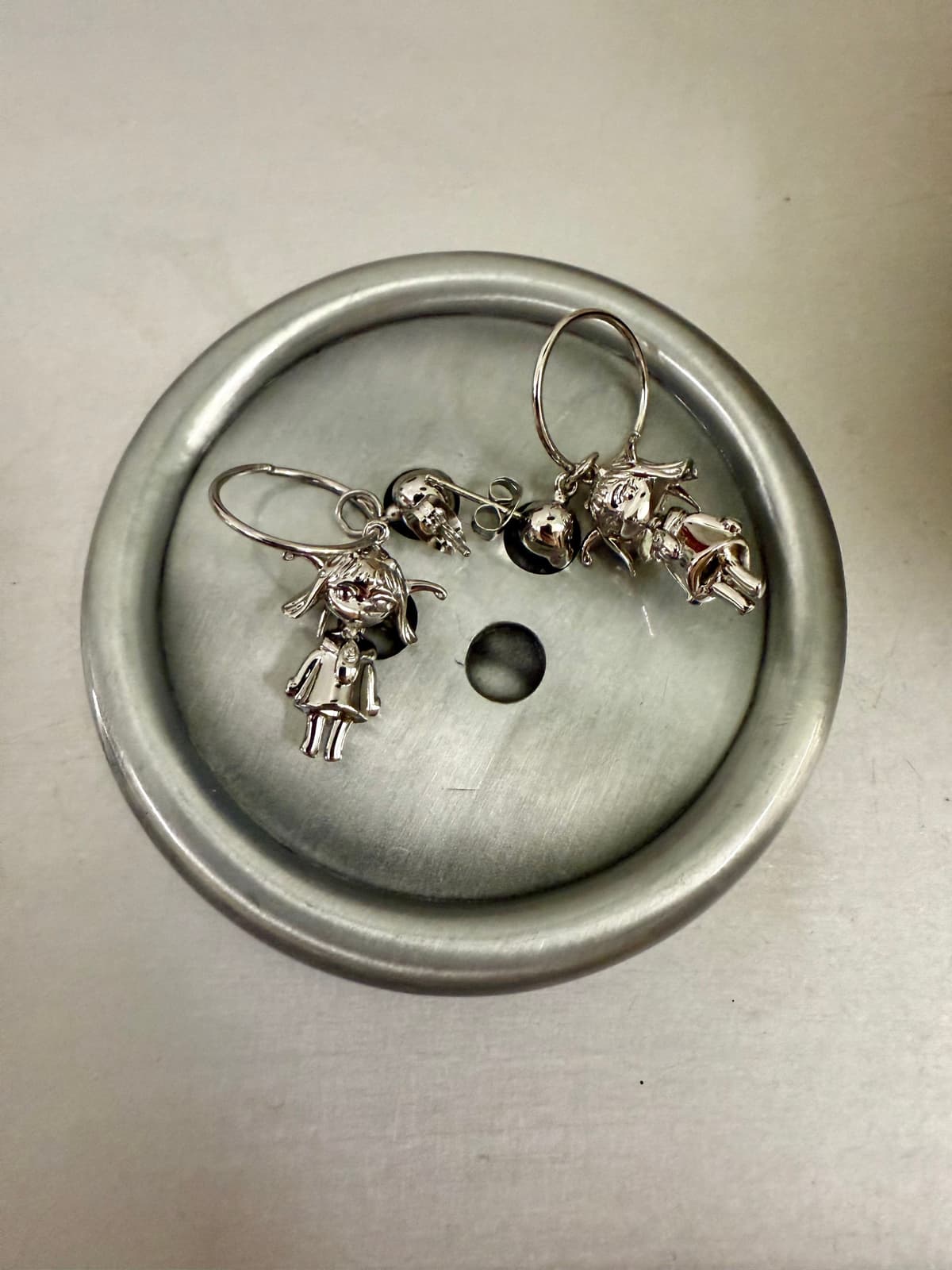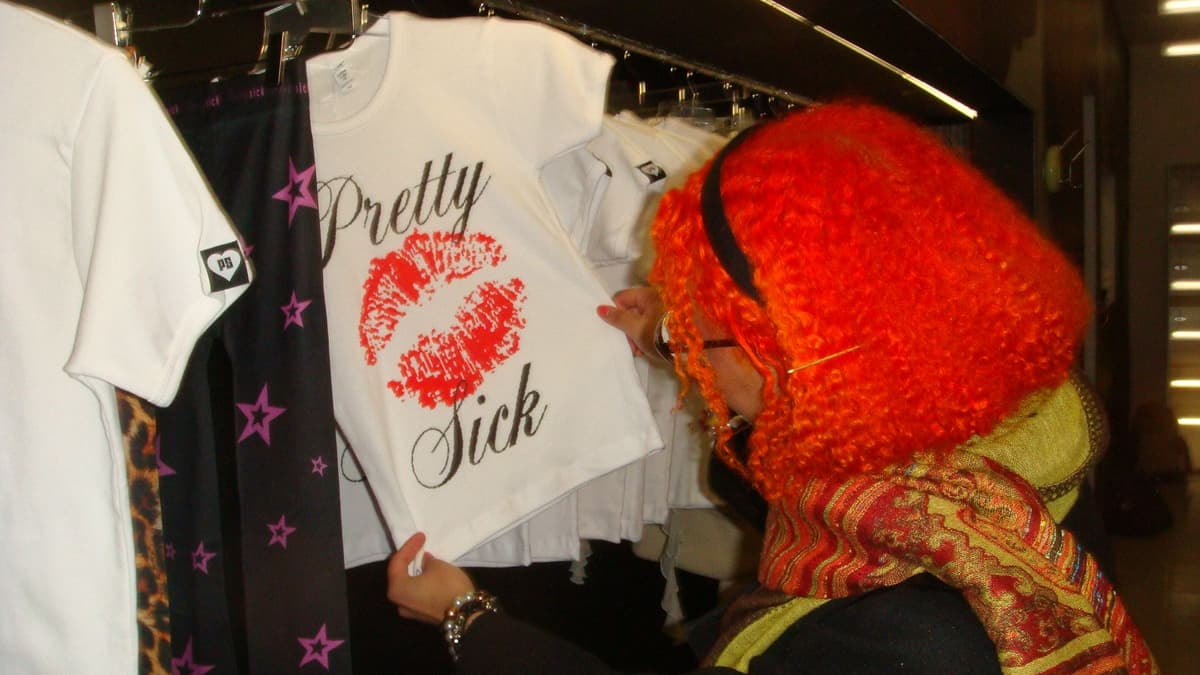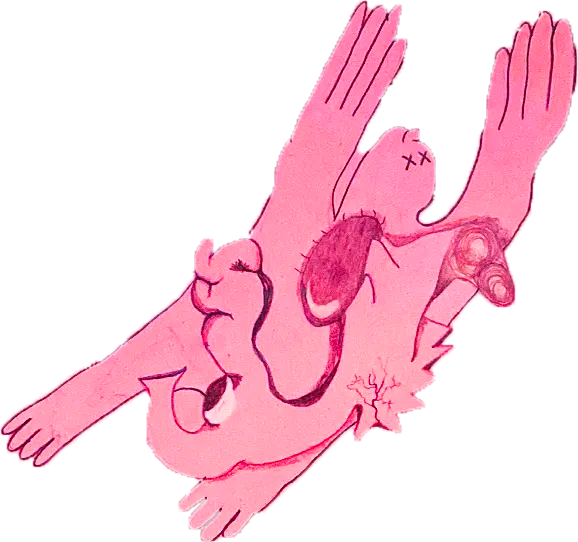CAFÉ FORGOT
Vita Haas

A big part of Café Forgot is not putting pressure on our designers to produce huge collections or host giant fashion shows like commercial brands do. If we like your work, we’re willing to sell it, even if it’s just one item. Everyone needs clothes, everyone has to decorate their house–why not buy cute stuff from someone you know, or a local, lesser known artist?
TESS POLLOK: Vita, you’re the co-founder of the iconic Café Forgot on the Lower East Side. It started as a series of pop-ups, correct? Before you and co-founder Lucy Weisner transformed it into a brick-and-mortar space.
VITA HAAS: Yeah, that’s all correct. Lucy and I started Café Forgot in 2017. We actually went to high school together and, later, college together in Portland, Oregon.
POLLOK: Oh, where in Portland?
HAAS: Reed.
POLLOK: Oh my god, Reed is so fascinating.
HAAS: It definitely was. It was an intense experience. Lucy and I had a great time, though, and we both studied art history. Portland is also really fun and an exciting place to explore fashion. We did one of our first pop-up shops at this store called Stand Up Comedy in Portland. That was kind of the genesis of our pop-up series. We were doing those through 2020, basically. Even before that, Lucy and I were always obsessed with fashion; we were co-presidents of the fashion club in high school and a lot of the designers that we worked with from the beginning of Café Forgot were friends of ours since high school. For example, jewelry designer Marland Backus–who’s credited on the website as the very first designer we ever carried–is a close friend of ours from high school. She was in fashion club with us.
Anyways, Lucy and I hosted pop-ups for a few years before deciding we wanted to try our hands at having an actual store. I’d graduated from college two years ago and she’d graduated from college a year before, but both of our lives were pretty boring at the time. I’d just gotten fired from my job at a coffee shop and did styling gigs here and there, Lucy was working at art galleries. We signed a year-long lease in 2020 and that was the first official location of Café Forgot. In 2021, we got an incredible COVID-19 deal on the lease at our current Lower East Side location, and we’ve been here ever since. Yeah. It’s been four, almost five years now.
POLLOK: Wow, co-presidents of the high school fashion club? You guys were so destined to do this.
HAAS: I know. I also feel like the things I like about running a store are not at all the things people expect me to like about running a score. I love the boring humdrum, like, quiet mornings coming in and organizing inventory by myself. Running the store has been amazing. It’s definitely something I’ve always wanted to do.
POLLOK: I always ask people if they believe in the left-brain/right-brain dichotomy, you know, analytical on one side and creative on the other. I found that out about myself as a magazine editor. I went into it thinking I was right-brained because I was creative, but I ended up enjoying running a business so much, ending up very left-brained. Like, I kept imagining it’d be so cute to run a bookstore, and I loved keeping Excel spreadsheets.
HAAS: I couldn’t agree more, inventory is so satisfying.
POLLOK: Where did you and Lucy shop growing up? Are there any particular stores that you can remember that influenced Café Forgot?
HAAS: So many. I remember there used to be this store in the East Village called the Deep End Club–I think we were 13, 14 back then. Back then, a really cool family friend of mine who was a little bit older took me and my sister there and we used to sit and have tea with the owner while looking at all the books and clothes. They had really amazing one-of-a-kind vintage pieces, I still remember that and the social element of it all, how cozy it felt.
There was another store Lucy and I both used to love called Betwixt and Between. It was more oriented towards pre-teens and had a kind of Limited Too vibe. But the pieces weren’t fast fashion, they were just, like, handmade pieces that were really girly and fun. There was also this store called Girl Props with a zebra print awning out front that I remember really distinctly.
POLLOK: So cute. I love all the bygone stores of my childhood.
HAAS: I know. I miss them. But when we got older we got to explore fashion more in Portland. It was actually better for two broke college students to be doing something like that in Portland, where things were still somewhat affordable, compared to back when we were growing up in New York City. Portland gave us an affordable way to stage pop-ups and experiment with what we liked and didn’t like, which later informed Café Forgot.

POLLOK: Aesthetically, how do you guys curate the designers you work with at Café Forgot? What are you looking for?
HAAS: I think we’re very intuitive about the designers we select. Lucy and I kind of have different tastes, but they complement each other well. In terms of my own style, I’m more a maximalist than her; I’ll kind of just wear anything. Lucy likes more high quality things and is someone who dresses more with a uniform in mind. In the end, the combination of those two attitudes tend to balance each other out.
We used to reach out to a lot of designers over email or Instagram DM, but these days, we actually find most of them through referrals from other designers that we work with. I think we both really enjoy working with someone who’s doing something different. I think that’s something we both cherish about Café Forgot: a chance to work with people who are making something different. It’s also really cool to work with designers where you can’t get their stuff anywhere else. Sometimes I’ll see things online and I’ll go, “Oh, I’ve always wanted to try that on, but I’ve never been able to.” That’s definitely a motivating factor. I like creating a space where people are actually able to do that.
POLLOK: My first brush with Café Forgot as a teenager was that you guys were bringing all of my Tumblr finds into the mainstream. My friends used to think I had such esoteric tastes because I could always find cool clothes on Tumblr, but then Café Forgot started carrying them. I distinctly remember buying the Maroske Peech Angel Cami in yellow because of a cute film photo of it on Tumblr, and multiple people at my high school asking me if I bought it at Café Forgot.
HAAS: Oh my god, that’s amazing. I know the shirt you’re talking about.
POLLOK: But that was also what drew me to your guys’ curation from the beginning, that you had a great eye for collecting the same things I was drawn to through girl-blogging. Finding items that, like you said, were not yet widely commercially available, and bringing them into a brick-and-mortar space.
HAAS: We occasionally supplement the store with pop-ups, still. There’s a store in Japan called Four-Eyed that we’re talking to right now about collaborating on a pop-up later this year. We also really want to go to LA. We think it’d be a perfect fit for us.
POLLOK: I’m from LA! What draws you to LA? Where do you want to host pop-ups?
HAAS: [Laughs] We need to do some serious research on this. Ideally, we want all the pop-ups to feel like your own little neighborhood store. I’m not super familiar with the geography of LA. I know a lot of people live in Silver Lake. I like the rotating rack we have in our store on the Lower East Side, I’d like to bring that out to LA.
POLLOK: I love the rotating rack!
HAAS: We’re also trying to expand through collaborations with other artists and designers we admire. This week, we’re hosting an event with Sabrina from the band Pretty Sick to promote some really cute merch for her. I’m really excited about that. We thought it would be a good thing to do during fashion week.
I think pop-ups and collaborations are huge for small businesses like Café Forgot. People really show up for in-person events, especially if you’re smart about hosting them during certain times of the year, like fashion week. We’re in Dimes Square, technically, so there’s a lot of foot traffic, and it would be a waste not to use that to our advantage. So, yeah, right now it’s busy, busy, busy at Café Forgot. I’m hoping I’ll have some time to slow down soon so I can spend some time merchandising and thinking about all the good things to come for the store in the future.
POLLOK: Yeah, pop-ups and events are so cute. I feel like they give you more room to experiment and be imaginative than a permanent, unchanging space. Do you feel safe running a business in Dimes? I was shopping there recently and saw someone get stabbed on the street.
HAAS: We have a buzzer now for that exact reason. We’ve never had any problems with shoplifting but there’ve been a few incidents with safety, which sucks. There are a lot of really mentally unwell people living on the street in New York and it can be scary, especially because our space is so small that typically there’s only one person working at a time. But, yeah, to speak to your point, I think having a business in Dimes Square has its advantages and disadvantages. Someone took out a knife in the store once.

POLLOK: Oh my god. Good thing you got the buzzer. Are you planning on staying in that location? What are you envisioning for the future of Café Forgot–I’m thinking not only of retail space but also of, like, future collaborations and designers you might like working with.
HAAS: [Laughs] That’s way too broad of a question! There are so, so many designers I dream about working with. Sorry, it always takes me a minute with questions like these–it’s like I freeze up or something.
Let me think about that. Yesterday, I saw the Zoe Gustavia Anna Whalen Fall 2025 Ready-to-Wear show, which I absolutely loved. She’s a designer that we already work with but it was obviously exciting seeing the new designs. She makes these dresses that are enormous structural pieces, just beautiful, more performance art piece than anything else. I’d love to carry some of what I saw in that show. Another designer I’m dying to work with is Izzy Di Pietro, founder of Bella Pietro. I just think her designs are so goth and fun and I especially love the witchy little sundresses she makes.
A lot of the designers I’m most excited about don’t necessarily produce whole collections or have fashion shows, they tend to just be people that I’ve met or whose work I’ve seen online that have made something I think is really cool. That’s a big part of Café Forgot. Like, you could literally give us a single item and we would sell it. There’s no pressure to be a huge commercial designer supplying us with multiples of every design–we also carry a lot of one-of-a-kind pieces. I like working that way because I think it allows the designers we work with to have other jobs. It’s extremely hard to just support yourself through fashion or design work. So we give people with small or limited pieces an opportunity to sell their clothes in a retail setting that’s typically reserved for huge commercial brands.
POLLOK: I’ve always loved that about Café Forgot. I like all your tchotchkes, too, and household stuff. The little objects you guys carry are always the best. Which one of you curates that? Should I call it your home goods section?
HAAS: [Laughs] I love all of our little objects! We just got in a collection of new vases for Valentine’s Day that I’m really excited about. We were selling a hot water bottle by lovethanks up until recently, which I think is now sold out, but I like those types of opportunities. I like selling things people need just for everyday life. Like, everyone has to buy things to decorate their home, so why not buy things that are really cute and made by someone you know, or a lesser known artist? I love our range of functional, everyday objects.
POLLOK: You mostly carry clothes. I would estimate that only, like, 5% or 10% of the store is ever objects. Do you ever think about expanding that, or do you like focusing on fashion?
HAAS: We like selling home goods and objects when it makes sense. We have an upcoming collaboration with Club Chess coming out in May. I don’t want to reveal too much, but we are working on a candle collaboration right now that I think is a great fit for us–but not everything is. I do think of Café Forgot fundamentally as a clothes store and on occasion we’ll find opportunities to expand on that as they arise.
POLLOK: Candles are crazy these days. I know several candle artists. Candles are becoming a booming cottage industry.
HAAS: Interesting. We’ve had so many candle phases at Café Forgot. We used to carry candles by Piera Bochner–these zany, colorful candles that sold out almost immediately. I’m definitely feeling a lot of excitement about our upcoming collaborations, which will include some candles.
POLLOK: I love Club Chess! We actually hosted our last event in New York City with them, as well. Do you have a favorite collaboration that Café Forgot has ever done?
HAAS: I’m a big coaster freak and I know one of the best-selling collaborations we’ve ever done is the button coaster with Marland Backus. Coasters and hot water bottles–this is what we’re looking for in terms of objects at Café Forgot: things that everybody actually needs. If you have to have these things in your home, the least they can do is be cute. In terms of general home goods that we carry at the store, I have to shout out the Flower Bunny Pillow by Sotka, too, which our customers are loving right now. Our classic pill box by Rebekah Bide. Again, it’s so practical–who doesn’t need a pill box in this day and age?
POLLOK: Are there any designers that influence your aesthetics and curation outside the realm of fashion?
HAAS: We’re both hugely inspired by films and TV shows and I personally love crafting. I went to this paper museum in Japan recently that inspired me so much. You could just sit and watch artisans folding these incredibly complex flowers out of paper. I loved it.
POLLOK: Beautiful! Any final suggestions for our readers? What’s the next thing they should buy from Café Forgot?
HAAS: [Laughs] Everything! All of it. But actually, our new sock collaboration with Doublesoul. Also available as a set of two. I’m obsessed with how cozy they are.
Vita Haas is the co-owner of Café Forgot, an experimental retail store founded in 2017 with Lucy Weisner.
Tess Pollok is a writer and the editor of Animal Blood.
← back to features
